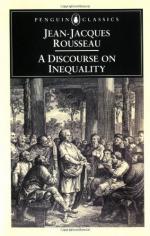
|
| Name: _________________________ | Period: ___________________ |
This quiz consists of 5 multiple choice and 5 short answer questions through Chapter 3, A Discourse on the Origin of Inequality, Dedication and Preface.
Multiple Choice Questions
1. What type of land does Rousseau prefer to live in?
(a) Where no man is equal.
(b) Where no art exists.
(c) Where he can live freely.
(d) Where everyone is equal.
2. According to Rousseau, what led to the degeneration of society?
(a) The progress of talent.
(b) The establishment of talent.
(c) The establishment of beauty.
(d) The progress of art.
3. What does Rousseau question moral behavior could strictly be brought about by?
(a) Compassion.
(b) Ignorance.
(c) Tolerance.
(d) Hatred.
4. What does Rousseau believe would return humans to the original state of society?
(a) Complete idleness.
(b) Giving up power.
(c) Complete desire.
(d) Incomplete passion.
5. What does Rousseau think the government and society can have?
(a) The same beliefs.
(b) The game goals.
(c) Opposing interests,
(d) Opposing goals.
Short Answer Questions
1. What is the abuse of morality generated by, according to "Chapter 2, A Discourse on the Moral Effects of the Arts and Sciences, Part II"?
2. What does luxury generate according to "Chapter 2, A Discourse on the Moral Effects of the Arts and Sciences, Part II"?
3. Human morals are not improved by what subject according to Rousseau?
4. What civilizations does Rousseau follow to track the decline of morality?
5. Which other civilizations were NOT mentioned by Rousseau as being impacted by the progress of art?
|
This section contains 246 words (approx. 1 page at 300 words per page) |

|




